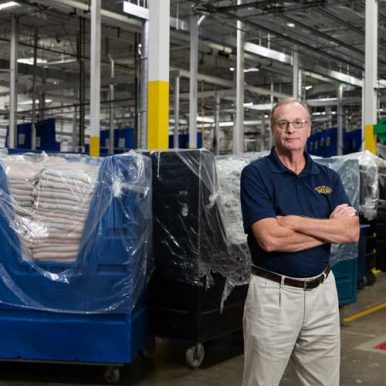All in the family
You can’t spell succession without ‘success’
M.J. McAteer //September 29, 2021//
In the popular HBO TV series “Succession,” members of the Roy clan scheme, lie and backbite in an attempt to take over the family’s media empire once the patriarch steps down. The show, which reportedly filmed scenes in Richmond in May for its third season, is a satiric festival of twisted relationships and family dysfunction, and it makes for entertaining television. It’s hardly a stretch, either, to think that some of the unseemly shenanigans on the show were inspired by the ugly, public squabbling among members of such real-life family empires as Rupert Murdoch’s News Corp. and the late Sumner Redstone’s National Amusements Inc.
But for most family businesses, that kind of discord would spell doom. If a family business is to survive through multiple generations, its members usually need to find and agree upon a way to hand off the baton as smoothly as runners in a relay race. Statistically, though, that isn’t so easy.
Recent data from the Ohio-based Conway Center for Family Business says that just 19% of family enterprises make it to the second generation, 12% to the third and only 3% into the fourth generation and beyond. That sounds awfully dismal, but in an article earlier this year in the Harvard Business Review,
family business advisers Josh Baron and Rob Lachenauer argue that despite that seemingly high failure rate, family firms tend to outlive their public counterparts.
Because a single generation is generally considered to be 20 to 30 years, even family enterprises that go belly-up within one generation still last a lot longer than most publicly traded companies, which, on average, fold in a shocking 10 to 15 years, according to a Yale study. Even more stunning, the U.S. Census Bureau reports that 78.5% of all small businesses don’t even survive a year, usually because of inadequate management, insufficient financing, ineffective planning or marketing mistakes. And that’s not even taking into account the COVID-19 pandemic, which led to the direct closure of 200,000 establishments nationwide last year, according to an April report by the Federal Reserve.
Nevertheless, Baron and Lachenauer say that family businesses have remained optimistic about their futures: 68% of the 140 family-owned companies they surveyed last December believed they would be more efficient after the pandemic, more than half looked forward to new opportunities and 25% expected not only to survive but grow. That optimism and comparative staying power will be crucial to the nation’s economy, given that the Census Bureau says that family businesses account for about 90% of American enterprises, half of all employment in the country and half of the gross national product.

Heir raising
Family businesses can thank some built-in advantages for their relative (so to speak) resiliency. Patrick Soleymani, associate dean of undergraduate programs and an associate professor of management at George Mason University’s School of Business, says these businesses have “a certain level of trust of intent” in knowing that their relatives “will go above and beyond” for their companies, certainly not something that public companies can rely on with their workers.
Family businesses also don’t have to be beholden to stockholders demanding quick profits. They can look at the big picture and not make the mistake of overleveraging their assets to achieve rapid but often short-term gains. “No one is looking over their shoulder,” says Gary A. Ballinger, a professor of commerce at the University of Virginia’s McIntire School of Commerce.
Many family companies take immense pride in serving their communities and providing for their employees, he says, and “if they want to run their businesses in a public service fashion, they can do that, and they can tell everybody else to stick it.”
Still, those advantages can evaporate in the face of what is known as “the shirtsleeve curse,” which references industrialist Andrew Carnegie’s alleged observation that family businesses go from “shirtsleeves to shirtsleeves in three generations.” The reasons for that rags-to-riches-back-to-rags scenario can be many.
“Family companies are often started by someone with a passion, and the kids and grandkids might not share that passion,” says Paula Sorrell,

associate vice president of innovation
and economic development at GMU. Yet, even if the passion is there, the younger generation may not always be qualified to take over.
“A family business can be like a kingdom, with an heir, even if that heir is not qualified to be king,” says Soleymani.

The first generation sometimes can have a hard time letting go, too, or accepting advice from younger relatives who may be more attuned to the times. “Imagine as a child having to tell a parent that something is wrong,” Soleymani says — or having to take orders from your brother or sister. “Siblings may not listen,” he says, a truth that anyone who has a sibling would not dispute.
Even for nonfamily members of the business, the transfer of control between generations can be a fraught time, says Ballinger, and that can “disrupt the social networks at the firm.”
No single approach is guaranteed to bridge the generation gap or smooth such bumpy interpersonal dynamics, but a Harvard Business Review study published last year found that 94% of family firms surveyed had supervisory or advisory boards with about 31% family membership.
Outside advice
Katharine Ross, president of Ross Publishing Inc. in Chesterfield County, falls into that majority. Her magazine publishing house was founded in 1991 by John and Lori Ross, whose three sons, Brian, Craig and Katharine’s husband, Johnny, joined the business a few years later. She has worked in the firm for 20-plus years and was named president in 2018.
“Succession was not an overnight thing,” Ross says of her elevation to the company’s top job. “Authority, autonomy and trust grew over a long period.” Nevertheless, in 2010, she brought in nonfamily members to help explore new revenue streams.
“We live, eat and breathe what we do,” Ross says, reflecting the all-in attitude typical of family businesses, but “we needed a new perspective to pull from.” Her 28-employee company, which publishes Boomer magazine and Seniors Guide magazine, has since expanded into seven markets. It’s also boosted its online presence and has started a digital media agency subsidiary, Ross Media Solutions.
“Feedback is your friend,” Ross says, “even if it doesn’t always feel like that at the time.”
Keith M. Nichols, president of HandCraft Services in Richmond, which provides health care linens and uniforms for hospitals and other care facilities, also brought in advisers to give his business structure. He didn’t start out with Ross’s passion for the family enterprise, though.
“I had planned to be a cowboy,” he says, echoing Sorrell’s contention that not all members of families’ younger generations are eager to join the family fold. Nichols’ intention was to work in the business just long enough to make the money to buy a truck to take him out west, but then he met his future wife, and that was all she wrote. “It’s not a glamorous business,” he says, but “it isn’t boring,” either.

HandCraft was founded by Keith’s father, John A. Nichols, in 1970 and was, at one time, the second-largest dry-cleaning business in Richmond. But after Keith Nichols and his brother, Jay, bought out their father in 1990, they began moving away from that sector of their business. “No one wears overcoats anymore,” Nichols says.
As they transitioned into the health care field, he and his brother divvied up responsibilities and made it a point not to second-guess one another, but in 2015, they brought in a consultant “to learn how to run a family business like a business, with clear-cut roles and accountability.”
Such advisers, Sorrell says, can help mediate honest but often uncomfortable conversations among family members. Soleymani calls it “family counseling: business edition.”
Imposing a formal structure on operations was the right thing to do for HandCraft. Nichols says his business “improved by leaps and bounds” and has grown to 500 employees. Today, the company only serves health care clients and, he says, it has an annual growth rate of 8% to 12%. The family’s third generation also has come on board. “They will be held accountable to perform at a high level,” says Nichols. “They have to understand what it takes to do the job.”
Home away from hom 0e
Other family-owned firms in Virginia have bucked the statistical need to bring in outsiders, yet have found success by keeping it all in the family.
Ramon W. Breeden Jr. founded The Breeden Co., a property development and management firm based in Virginia Beach, in 1961. While he remains the company’s chief executive and is active in every deal, his son, C. Torrey Breeden, joined the firm in 1998 after graduating from U.Va. with a business degree. He became the firm’s executive vice president about 15 years ago after working in all the company’s divisions to firm up his grasp on operations.
“There is no need to bring in outsiders/advisers,” Ramon Breeden says. “Our recipe of success is working, and there is no need to deviate.” That recipe includes refraining from dispensing advice to his son.
“Torrey, himself, is very skillful in his abilities,” his father says. “He may approach a deal differently than me, and that’s OK.” That formula seems to be working for the 400-employee company. In 2020, it did more than $350 million in business.

Richard “Den” Crallé III is of a similar mindset. He is the third Richard Crallé to run Green Front Furniture, and he knew exactly what he was getting into when he took over as president of the 120-employee Farmville-based retailer before he was even 30.
“I started off working summers, running up and down rug piles,” he says.
Like C. Torrey Breeden, Crallé hasn’t exactly been flying solo — his father, Richard Jr., and his mother, Terry, still work at the company. But the younger Crallé is the company’s president, and since assuming that role in 2018, he has added “new looks, new vendors and new lines,” modernized the store’s 1 million square feet of display space and installed a new point-of-sales system. His inaugural effort to sell rugs online “is going great,” he says.
Like a true millennial, Crallé is a believer in the power of social media, and he likes to appear personally in videos to promote Green Front products, a marketing tool that is unlikely to have occurred to people in his parents’ generation.
Not having to answer to a board has allowed him to be “more nimble” in responding to the changing market, Crallé says. “There’s not a lot of red tape.”
But of course, that freedom from outside oversight comes with a downside — almost no separation between work and home. “You never get a break,” Soleymani says. “You go on vacation with your business partner.”
The George Mason professor remembers how his own father, who started several family businesses, would run ideas past his captive audience in the car. It also has been said that family businesses are a classic case of capitalism at work and socialism at home, as family members are sometimes used as sources of free labor.
Tammi Ketterman is well aware of that dynamic. She and her husband, Dan, run Ketterman’s Jewelers in Leesburg. As children, all six of the Kettermans’ daughters appeared in ads for the family store, which was founded in 1988. Four of them, all grown up now, still work there. “They bring relevance,” Ketterman says. “I think we would have gone under without them.”
But she also remembers worrying that her girls would grow to resent the business, only seeing its demands and not its rewards. “If I have any regrets, it would be carrying unhappy experiences home to the dinner table,” she says. “That can be too much of a burden sometimes.”
It’s a burden that comes with the territory, though. However families choose to run their operations, the bottom line doesn’t really vary: Working in the family business will never be just a job, and leaving your work at the office is not going to be possible. Just look at the Roy clan of “Succession.”

















